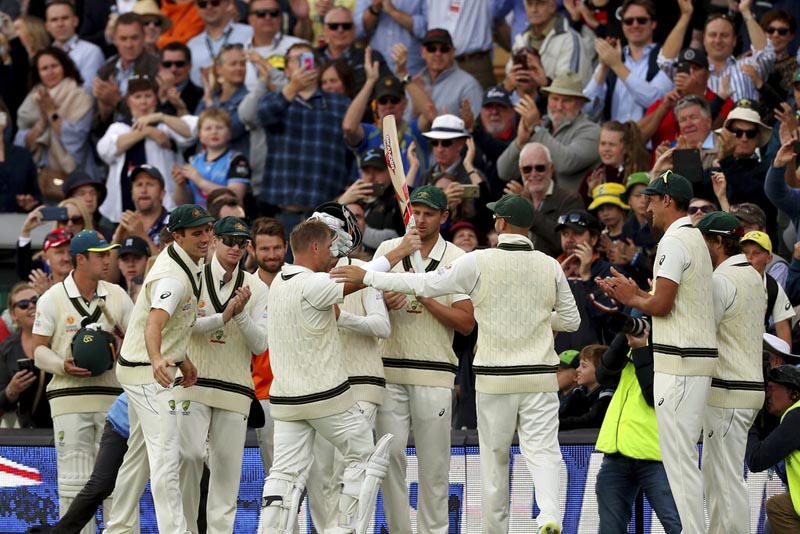Warner’s 335 puts Australia in charge of 2nd test v Pakistan
ADELAIDE: David Warner produced the biggest innings ever in the day-night test cricket format and surpassed some of Don Bradman’s records before finishing unbeaten on 335 when Australia captain Tim Paine declared at 589-3 on day two against Pakistan.
Paine’s decision to put the team above the individual on Saturday evening left Warner in second spot on Australia’s all-time list of biggest test scorers, behind only Matt Hayden’s 380 against Zimbabwe in 2003.
But it had rewards for the Australian team, with paceman Mitchell Starc taking four wickets for 22, including a double-wicket maiden near the end, as Pakistan struggled to 96-6 at stumps.
Babar Azam was 43 not out at stumps, and Yasir Shah was on 4.
Warner had just taken a single to surpass 334, which was the great Bradman’s highest test score, when Paine called him back to the pavilion in order to give the Australian pacemen the new ball under lights.
Along the way, Warner shared a 361-run stand with Marnus Labuschagne (162), a record for Australia against Pakistan, and had partnerships of 121 with Steve Smith (36) and 99 with Matthew Wade, who finished unbeaten on 38 from 40 balls.
Warner was almost immediately in the action in the field, too.
Pakistan openers Shan Masood (19) and Imam-ul-Haq (2) both got the better of decision referrals in the first two overs before Starc claimed the breakthrough, getting a thick edge off ul-Haq’s bat that carried at waist-height to Warner in the gully. Pakistan was 3-1 at the dinner break.
The first five sessions were painful for Pakistan, with Shaheen Afridi’s three wickets the only highlights. The sixth session went entirely to Australia, too, with five wickets tumbling.
Warner, who missed the last southern summer while serving a 12-month ban and entered the series against Pakistan after a poor Ashes in England, beat Bradman’s record of 299 not out — set against South Africa in 1931-32 — for the highest test score at the Adelaide Oval.
Then he just kept going, and finally was called back into the pavilion with the 10th-highest score ever in a test match — Brian Lara’s 400 not out remains the record.
Warner had one reprieve in the first test at the Gabba, when he was caught on 56 off a no-ball from 16-year-old Naseem Shah. He had another reprieve on Saturday, this time on 226 and against another test rookie, when he edged 19-year-old Muhammad Musa to the slips but stayed at the crease because the young paceman had over-stepped.
“At the moment I’m getting a little bit of luck ... (but) I’ve been very disciplined my last two innings,” Warner said as he walked off the field at the end of the second session on day two. “At the moment, we’re in a good position.”
Warner’s innings lasted 418 balls and contained 39 fours and one six and, combined with his 154 in the first test against Pakistan last week, has no doubt cemented his place in the Australian team.
That came into question when he scored 95 runs in 10 innings in the Ashes in August and September, getting one half-century, making three ducks and failing to get out of single figures every other time except once — when he was out for 11.
Smith’s return to the runs ensured he became the fastest batsmen to pass 7,000 career runs in test cricket.
Smith was the highest scorer in the Ashes but was out for four in the series-opener against Pakistan at the Gabba, where Australia won by an innings and five runs.
He was more circumspect in Adelaide and more deliberate each time he set up on strike before first interval, ensuring he reached the milestone in his 126th innings and beating a record set by England’s Walter Hammond in 1946.
But he played an extravagant Twenty20-style attempted slog off Shaheen and got an inside edge to wicketkeeper Mohammad Rizwan.
That gave Shaheen his second wicket of the day after bowling Labuschagne with the new ball.
Shaheen returned figures of 3-88 from 30 overs, but the other bowlers were expensive. Leg-spinner Yasir Shah returned 0-197, test rookie Musa went wicketless for 114 and veteran seamer Mohammad Abbas had figures of 0-100.






